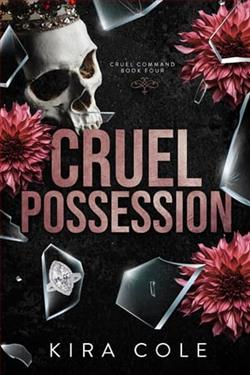Page 90 of Forced to Marry the Russian Pakhan
Neither of us speaks at first. The only sounds are our gradually slowing breaths and the distant hum of the house. I trace patterns on her bare back, not wanting to break the spell.
I pull her closer, burying my face in her hair to hide the emotion I know must be written all over my face.
Fear. Because sooner or later? She’s going to decide on her next move. And if she chooses to leave, I might just break in two.
She settles against me, head on my chest, one leg thrown over mine. It feels right, having her here. Like something clicking into place that I didn’t know was misaligned.
And I wonder if she feels the same.
***
The days that follow blur together. I go through the motions at work, but my mind keeps drifting back to her.
And the doubt? It creeps in during quiet moments. The Fyodorovs won’t give up easily. They’ll try to convince her to return to them, to choose her blood family over the one we’re creating. And when they do, will her resolve hold? Or will she realize that she’s better off without me, without this life?
The thoughts plague me, making me distracted during important discussions, causing me to miss details I would normally catch immediately.
“You’re not listening,” Valentin says, snapping his fingers in front of my face during a strategy meeting. “Again.”
I blink, forcing myself to focus. “What?”
“The shipment details,” he repeats, exasperated. “Are you with us or not?”
“I’m here,” I say, straightening in my chair. “Continue.”
But even as he lays out the plan for our next move against the Zakharovs, my mind drifts back to Yulia. To the fear that one day I’ll come home and find her gone.
The distraction follows me to the docks two days later, where I’m overseeing a particularly delicate transaction. The buyer is nervous, jumpy, setting off warning bells that I would normally heed immediately.
But I’m not thinking clearly. I’m thinking of Yulia’s smile at breakfast this morning, of the way she kissed me before I left, of the growing curve of her stomach where my child grows.
I miss the signal from Iosif. Miss the subtle shift in the buyer’s posture. Miss the telltale bulge of a concealed weapon.
The first gunshot cracks through the night like thunder.
Suddenly, the world snaps back into focus. Training kicks in, muscle memory taking over where conscious thought has failed. I dive for cover, drawing my own weapon as I shout orders to my men.
“Ambush! Take cover!”
Chaos erupts around me. Gunfire, shouts, the pounding of feet on concrete. I spot Iosif pinned down behind a stack of crates, Leonid returning fire from behind a forklift.
I assess the situation, counting the enemies and evaluating their positions. This isn’t a random attack. It’s coordinated, well-planned. The Zakharovs!
I move quickly, staying low, making my way toward the main warehouse where most of my men are trapped. Three attackers block the path, firing indiscriminately.
I take the first one down with a clean headshot. The second spins toward me, but he’s too slow. My bullet catches him in the chest. The third gets off a shot that whistles past my ear before my return fire silences him.
“Pakhan!” one of my men calls. “This way!”
I follow him into the warehouse, where a dozen of our people are exchanging fire with what looks like twice as many hostiles. The air is thick with gun smoke and the ugly scent of blood.
“Get them out through the back,” I order, gesturing to the wounded. “Valentin, cover the east exit. Leonid, with me.”
We move as a unit. We’re almost through, almost in control of the situation, when I spot someone directing men from behind a steel pillar. Our eyes meet across the warehouse floor, and I see the moment of recognition in his face.
He raises his weapon. I raise mine.
We fire simultaneously.















